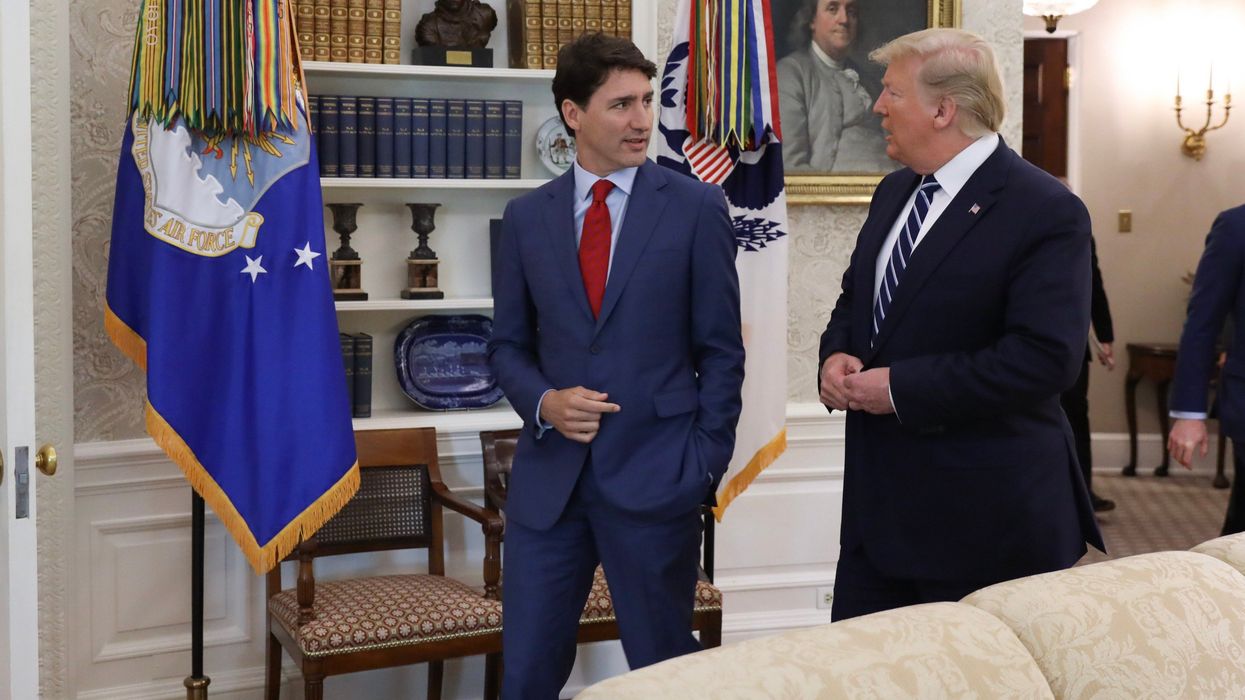Trump is still threatening tariffs on Canada and this is how it might impact your wallet
Trudeau says Canadians "could be facing difficult times in the coming days and weeks."

Justin Trudeau and Donald Trump in the White House.
Donald Trump is still threatening Canada with tariffs as Justin Trudeau warns of a "forceful" response and potentially "difficult times" for Canada.
If tariffs are implemented by the U.S. government, there could be an impact on Canadians, including higher food prices and job losses.
Trump has said that his government would impose a 25% tariff — basically a tax on foreign goods and services — on all Canadian imports.
The tariffs are expected to be officially announced on Saturday, February 1, 2025.
If the U.S. puts a tariff on Canadian imports, the cost of bringing Canadian goods into the U.S. would go up for American companies, according to the Financial Post.
The cost would then be passed on to consumers on both sides of the border.
Trudeau said Canada is ready to deliver a "purposeful, forceful but reasonable, immediate" response to Trump's tariffs on Canadian imports.
He noted that the country "could be facing difficult times in the coming days and weeks," which might have Canadians worried.
"I want them to know the federal government, and indeed all orders of government, have their backs," Trudeau said.
Here are some of the potential impacts of U.S. tariffs on Canadian imports.
Food prices
Fraser Johnson, a supply chain expert and professor at Western University's Ivey Business School, told the Toronto Star that the Canadian dollar would take a hit if tariffs come into effect.
That would make almost everything Canada imports more expensive — including food.
Johnson noted that fresh produce from the U.S. would cost more almost instantly because wholesalers pay American suppliers in U.S. dollars. Even fruit and vegetables from other countries are often priced in U.S. dollars.
Other products like clothes, electronics, and household appliances would eventually cost more because producers are often paid in American dollars.
It wouldn't be immediate like the price hike on fresh produce, though. It's expected to take longer to impact shoppers in Canada though, Johnson said.
Gas prices
Johnson told the Star that putting gas in your car would also get more expensive — and quickly — as tariffs weaken the Canadian dollar.
"Oil and gas contracts are priced in U.S. dollars, so we'd notice the effect on prices at the pump pretty quickly here if the loonie's dropping," Johnson said.
But it's still unclear if Canadian oil will be included in the tariffs.
"We may or may not," Trump said at the White House on January 30. "We'll see. It depends on what the price is. If the oil is properly priced, if they treat us properly – which they don't."
Jobs
According to the Financial Post, Canadian jobs could be at risk as a result of Trump's tariffs.
There's the possibility that as prices go up, businesses in Canada could struggle and jobs could be lost.
Andreas Schotter, a professor of international business at Western University’s Ivey Business School, told the Financial Post that if tariffs reduce demand for imported Canadian products, businesses may cut back on production and eliminate jobs.
Inflation
Bank of Canada governor Tiff Macklem recently said that "the higher cost of imported goods will put direct upward pressure on inflation," according to the Toronto Star.
Interest rate
The Bank of Canada has been reducing the interest rate to stimulate growth as the economy and inflation slows.
According to the Toronto Star, BMO's chief economist Douglas Porter said that interest rates are expected to go even lower if "broad" tariffs are imposed on Canada by the U.S.
Interest rates affect mortgages and other types of loans, earnings on savings accounts, investment returns, inflation, and more.
This article's cover image was used for illustrative purposes only.